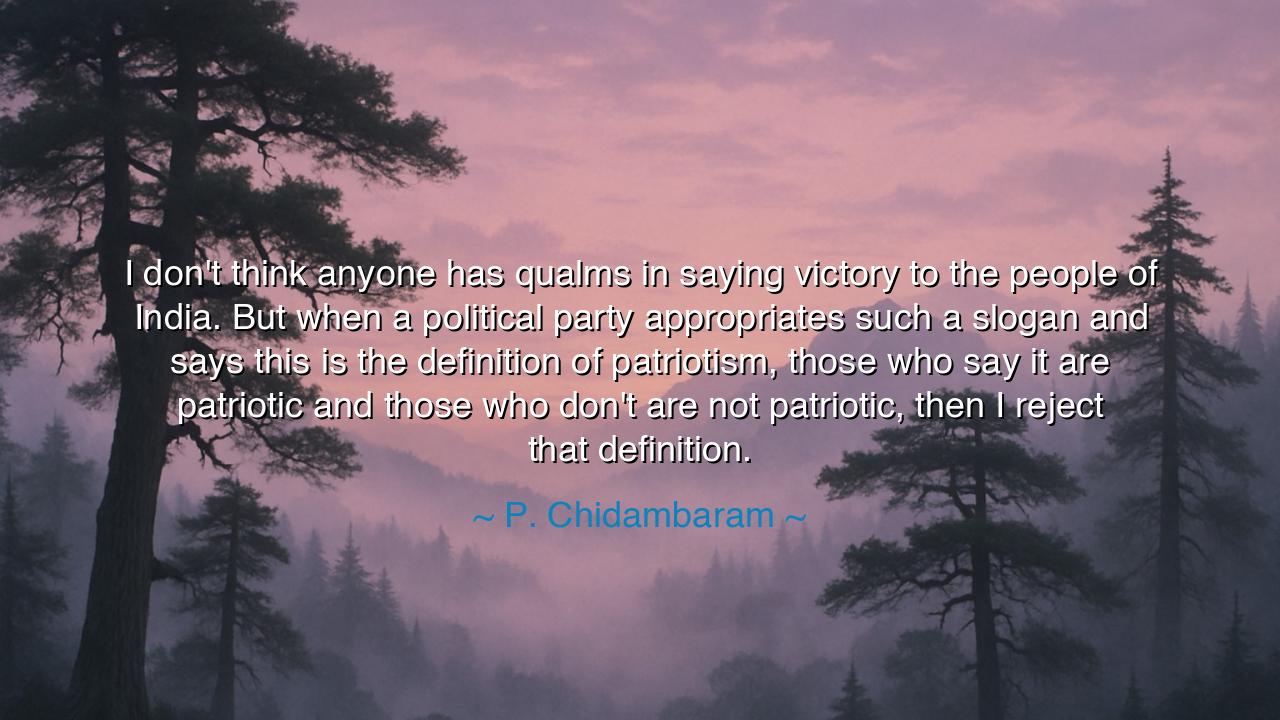
I don't think anyone has qualms in saying victory to the people
I don't think anyone has qualms in saying victory to the people of India. But when a political party appropriates such a slogan and says this is the definition of patriotism, those who say it are patriotic and those who don't are not patriotic, then I reject that definition.






P. Chidambaram, elder statesman of India, once proclaimed with measured defiance: “I don't think anyone has qualms in saying victory to the people of India. But when a political party appropriates such a slogan and says this is the definition of patriotism, those who say it are patriotic and those who don't are not patriotic, then I reject that definition.” In these words lies a warning against the narrowing of patriotism, that sacred devotion to one’s land and people, into a mere tool of partisanship. True patriotism belongs to the people—it is not the possession of rulers, nor the monopoly of parties. When it is claimed as the private property of one faction, it ceases to be noble and becomes a weapon of division.
The origin of these words comes from India’s living struggle with democracy, where diverse voices, faiths, and traditions converge. Chidambaram, a lawyer, thinker, and former minister, knew well the danger of reducing love of country to a slogan bound to a single group. His declaration honors the deeper truth that nations are larger than parties, that the cry of “victory to the people” belongs to all, and that true patriotism cannot be confined by the lines of ideology or faction. His words stand as a shield, defending the people’s unity from the chains of political appropriation.
History offers us vivid examples of this same truth. Consider Nazi Germany, where love of country was seized by one party, one man, and turned into an instrument of fear and hatred. Those who cheered were called patriots; those who questioned were branded traitors. But what was lost in the process? The soul of the nation itself. Patriotism twisted into narrow partisanship leads not to unity, but to tyranny. Chidambaram’s warning echoes through such tragedies: beware when political power tries to claim exclusive rights to the nation’s heart.
Yet we may also look to nobler examples. In India’s own struggle for independence, patriots of every background—Hindus, Muslims, Christians, Sikhs, atheists—stood together to cry for freedom. Their patriotism was not measured by who led their faction, but by their willingness to sacrifice for the whole. Gandhi, Nehru, Patel, Subhas Chandra Bose—though differing in method and vision—all drew from the same well of national devotion. None could say, “Patriotism is mine alone.” For patriotism then was expansive, inclusive, and powerful enough to topple an empire.
The deeper meaning of Chidambaram’s words is that patriotism is too sacred to be reduced to a slogan. When wielded narrowly, it ceases to unite and instead divides neighbor against neighbor. But when understood rightly, it is not the property of the few—it is the inheritance of the many. True patriotism is lived in service, in justice, in devotion to the people and the land, not in chanting words demanded by power.
The lesson for us is clear: do not let others define your love for your country by whether you speak their slogans or march under their banner. Guard your patriotism from manipulation. Recognize that true loyalty is not blind obedience, but active care for the people, the soil, and the values that sustain them. Resist any attempt to equate dissent with betrayal or silence with disloyalty. For nations are strongest not when voices are uniform, but when unity arises amidst difference.
Practically, this means exercising your citizenship with integrity and independence. Speak the words of pride for your nation, yes, but also act in service of its people. Honor your flag, but remember it represents all, not just a part. Do not allow leaders or parties to draw false boundaries around the soul of your homeland. Instead, defend the right of all people to express their patriotism in many ways—through service, through sacrifice, through honest criticism, or through silent devotion.
So remember, children of tomorrow: patriotism is not the monopoly of any party, but the birthright of the people. It is not proven by the shouting of slogans, but by the living of values. Reject those who would chain it for their own power, and embrace a patriotism that is broad, generous, and unifying. For only then will the cry of “victory to the people” ring true—not as a partisan chant, but as the eternal heartbeat of a free and noble nation.






AAdministratorAdministrator
Welcome, honored guests. Please leave a comment, we will respond soon